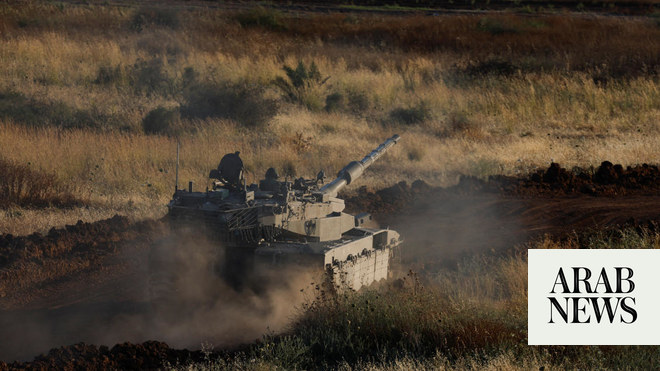JEDDAH/RAFAH: Israeli tanks and troops battled Hamas and Islamic Jihad fighters in central and northern Gaza on Sunday as the invading forces returned to parts of the enclave from which they had earlier pulled out after some Hamas militants regrouped in areas the military said it had cleared months ago.
Palestinians reported heavy Israeli bombardment overnight in the urban Jabaliya refugee camp and other areas in northern Gaza, which has been largely isolated by Israeli forces for months. UN officials say there is a “full-blown famine” there.
Residents said Israeli warplanes and artillery also struck the Zeitoun area east of Gaza City, where troops have battled militants for over a week. They have called on tens of thousands of people to relocate to nearby areas.
“It was a very difficult night,” said Abdel-Kareem Radwan, a 48-year-old from Jabaliya. He said they could hear intense and constant bombing since midday Saturday. “This is madness.”
First responders with the Palestinian Civil Defense said they were unable to respond to multiple calls for help from both areas, as well as from Rafah.
In central Gaza, staff at the Al Aqsa hospital in Deir Al-Balah said an Israeli strike killed four people.
Rear Adm. Daniel Hagari, the top Israeli military spokesman, said forces were also operating in the northern towns of Beit Lahiya and Beit Hanoun, which were heavily bombed in the war’s opening days.
“We have identified attempts by Hamas to rebuild its military capabilities in Jabalia, and we are acting to destroy these attempts, military spokesman Daniel Hagari said. There were also intense clashes and heavy gunfire from Israeli helicopters in the Zeitun area.
Hamas’ military wing said it shelled Israeli special forces east of Jabaliya and fired mortar shells at troops and vehicles entering the Rafah border crossing area.
“Hamas’ regime cannot be toppled without preparing an alternative to that regime,” columnist Ben Caspit wrote in Israel’s Maariv daily, channeling the growing frustration felt by many Israelis more than seven months into the war.
“The only people who can govern Gaza after the war are Gazans, with a lot of support and help from the outside.”
(With AP)
FASTFACT
35,034
Palestinians have been killed and 78,755 others wounded in Israel’s military offensive on Gaza since Oct. 7.
In Rafah, the exodus of Palestinians from Gaza’s last refuge accelerated Sunday as Israeli forces pushed deeper into the southern city.
Israel had begun a limited ground offensive in defiance of the US and other allies. Kuwaiti Hospital said it had received the bodies of 18 Palestinians killed in the past 24 hours.
The Health Ministry said at least 63 people had been killed over the past 24 hours, bringing the death toll from Israel’s offensive in Gaza to at least 35,034, mostly women and children.
In the US, Secretary of State Antony Blinken said Israel had still not explained how it would protect civilians in Rafah.
“There are certain systems that we’re not going to support and supply for that operation,” he said.
“Israel needs to have a clear, credible plan to protect civilians, which we haven’t seen.”
Rafah is considered Hamas’ last stronghold. Some 300,000 of the more than 1 million civilians sheltering there have fled the city following evacuation orders from Israel, which says it must invade to dismantle Hamas and return scores of hostages taken from Israel in the Oct. 7 attack that sparked the war.
Neighboring Egypt issued its strongest objection yet to the Rafah offensive, saying it intends to formally join South Africa’s case at the International Court of Justice alleging Israel is committing genocide in Gaza — an accusation Israel rejects. The foreign ministry statement cited “the worsening severity and scope of the Israeli attacks against Palestinian civilians.”
United Nations human rights chief Volker Turk said in a statement that he cannot see how a full-scale invasion of Rafah can be reconciled with international humanitarian law.
US Secretary of State Antony Blinken reiterated opposition to a major military assault on Rafah, and told CBS that Israel would “be left holding the bag on an enduring insurgency” without an exit from Gaza and postwar governance plan.
Gaza has been left without a functioning government, leading to a breakdown in public order and allowing Hamas’ armed wing to reconstitute itself even in the hardest-hit areas. On Sunday, Hamas touted attacks against Israeli soldiers in Rafah and near Gaza City.
Israel has yet to offer a detailed plan for postwar governance in Gaza, saying only that it will maintain open-ended security control over the enclave of about 2.3 million Palestinians.
Internationally mediated talks over a ceasefire and hostage release appeared to be at a standstill.
Prime Minister Benjamin Netanyahu in a Memorial Day speech vowed to continue fighting until victory in memory of those killed in the war. But in Tel Aviv, hundreds of protesters stood outside military headquarters and raised candles during a minute-long siren marking the day’s start, demanding an immediate ceasefire deal to return the hostages.
Netanyahu has rejected postwar plans proposed by the United States for the Palestinian Authority, which administers parts of the Israeli-occupied West Bank, to govern Gaza with support from Arab and Muslim countries. Those plans depend on progress toward the creation of a Palestinian state, which Israel’s government opposes.
The Oct. 7 attack killed around 1,200 people, mostly civilians, and took another 250 hostage. Militants still hold about 100 captives and the remains of more than 30.
Israel’s offensive has killed more than 35,000 Palestinians, mostly women and children, according to Gaza’s Health Ministry, which doesn’t distinguish between civilians and combatants in its figures. Israel says it has killed over 13,000 militants, without providing evidence.


